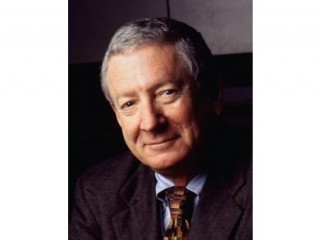
Alfred G. Gilman biography
Date of birth : 1941-07-01
Date of death : -
Birthplace : New Haven, Connecticut, U.S.
Nationality : American
Category : Science and Technology
Last modified : 2011-09-20
Credited as : physicist, pharmacologist, Nobel Prize in Physiology or Medicine
0 votes so far
American pharmacologist Alfred G. Gilman studied cell communication, the means by which information from the beyond a specific cell is conveyed to within that cell through a complex chain of events. He discovered G-proteins, so named because they bind to guanine nucleotides, a key component of deoxyribonucleic acid (DNA) and ribonucleic acid (RNA). A crucial intermediary between receptors on the cell membrane and subsequent actions inside the cell, G-proteins are believed to be involved in cellular activities from mating in the lowest yeast to the thought process in the human mind, and faulty G-proteins are implicated in diseases from alcoholism to whooping cough. He was awarded the Nobel Prize in Medicine in 1994, sharing a $930,000 cash stipend with biochemist Martin Rodbell, who conducted separate but related research at the National Institutes of Health.
Gilman's father was a Professor of Chemistry at Yale and later Columbia, and co-authored a textbook with a friend, Dr Louis S. Goodman -- from whom Gilman got his middle name. As a boy, his interest in science was aroused in his father's laboratory, and as a young man he studied at Case Western under Nobel laureate Earl W. Sutherland, Jr., and worked at the National Institutes of Health under another Nobel winner, Marshall W. Nirenberg. Gilman has also edited the sixth through tenth editions of the textbook his father co-authored, Goodman and Gilman's The Pharmacological Basis of Therapeutics.
Awards:
Lasker Award 1989
Nobel Prize for Medicine 1994 (with Martin Rodbell)
Federation of American Scientists Board of Sponsors
National Academy of Sciences
Scientists and Engineers for America
Member of the Board of Eli Lilly (1995-)
GlaxoSmithKline Lab worker (1962, at Glaxo predecessor Wellcome)
















